School WatSani
The School WatSani project aims to make safe water and improved sanitation accessible in 10 schools (primary and secondary education) in Dogu’a Tembien district, north Ethiopia.[1][2] Through nudging approach, the students are sensitised for using the sanitation and water facilities.[3]
| School WatSani | |
|---|---|
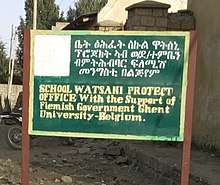 | |
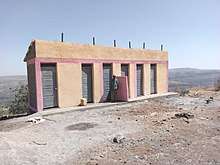 Ecosan toilets at Kolal school | |
| Location | Hagere Selam, Dogu’a Tembien (13°38′50.4″N 39°10′23.3″E) |
| Owner | Non-Profit Organisation |
| Country | Ethiopia |
| Established | 2018 |
Schools where the project is implemented
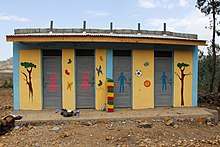
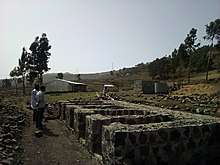
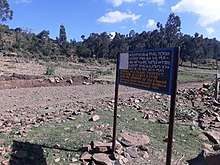
The School-Watsani project is implemented in 10 schools. In all schools, Ecosan toilet buildings have been constructed and training given on their use. In several schools water availability was improved and nudging implemented.
Research
The project is deployed to the interaction with students who will shape aspects of the project, in close interaction with the local society.[1]
Embeddedness
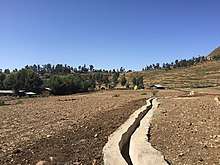
By actively enabling teachers and pupils in all aspects of the project, this project aims to grow the school as a knowledge pool around water and sanitation and to have a positive effect on society as a whole. Since this society consists mainly of small-scale farming families, a link is also made to the strengthening of small-scale agriculture and exemplary water management is strengthened around the schools.[1]
Not only the school's hygiene and water supply are positively affected but also the surrounding community. The municipality has meetings with the partners, school and the community. For example, there is local foundationof the project and the investments. The investments are necessary and will be met with local contractors and the surrounding community. It not only brings investment but also provides the necessary support through nudging for the right use and encouragement of use. In addition to the investments, the project also takes into account local/scientific knowledge/techniques to influence water availability. The design of the latrines is the right one adapted for the environment. The project thinks about sustainability, is open to improvement and learns from mistakes.[4]
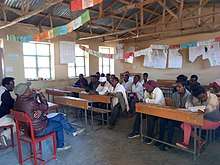
Impact on Sustainable Development Goals [4]
- SDG 6: water and sanitation
- SDG 1: no poverty
- SDG 2: no hunger
- SDG 3: health
- SDG 4: education
- SDG 13: climate
- SDG 17: partnerships
Partnership
The partners involved have extensive experience in Ethiopia, knowledge of the proposed project activities and have been working together for several years with the local partners of Dogu'a Tembien district administration and Mekelle University. Ghent University avails its expertise and useful equipment. Engineers Without Borders[6] is involved in the preparation of the technical plans and the engineer-specific support for the planned infrastructure. Hogeschool West-Vlaanderen provides support for the development of learning and communication tools. The Belgian Red Cross provides expertise in the field of WASH and sensitisation. The Environment Department of the Flemish government (Belgium) co-finances this project, which has a duration of 36 months (2018-2020).[1]
Previous project: Selam WatSani
A precursory project, called Selam WatSani, operated in the same district. The coordinator of the project was Ghent University, the KULeuven brought expertise. Environment Department of the Flemish government (Belgium) co-financed this project, which lasted from 2012–2014.[7]
Aims
The aim of this project was to achieve an integrated expansion and management of water and sanitation for the inhabitants in the small town of Hagere Selam and the rural municipalities of Mika'el Abiy and Ayninbirkekin. There were immediate positive implications for social services, women's position, human dignity and poverty alleviation. Special attention was paid to the participation and education of local communities.[7]
Realisations
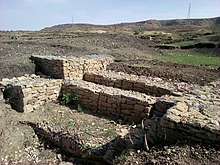
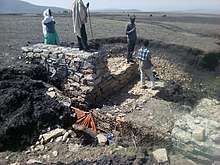
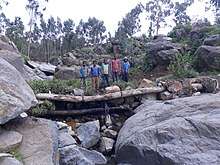
The project improved water distribution in the city of Hagere Selam and the surrounding rural areas; promoted infiltration on steep slopes (among others through use of subsurface dams);[8] developed sanitary facilities; improved waste management and processing; efficient handling of storm runoff from Hagere Selam using check dam and log dams;[9] awareness and capacity building on safe drinking water, hygiene, sanitation and management of natural resources.[2][7]
References
- De school als hotspot voor veilig water en verbeterde sanitatie (Dogu’a Tembien, Noord-Ethiopië) http://www.watervoorontwikkeling.be/de-school-als-hotspot-voor-veilig-water-en-verbeterde-sanitatie-dogu%E2%80%99a-tembien-noord-ethiopi%C3%AB
- Reubens, B. and colleagues (2019). Research-Based Development Projects in Dogu'a Tembien. In: Geo-trekking in Ethiopia's Tropical Mountains — The Dogu'a Tembien District. SpringerNature. doi:10.1007/978-3-030-04955-3_30. ISBN 978-3-030-04954-6.
- Griet Verrewaere, 2019. Report of latrine use and behaviour amongst students - The nudging approach at School-Watsani. HOWest, Bruges, Belgium.
- Jeroen Berloo, 2019. Update to baseline study about water and sanitation in eight selected schools by the project ‘School – Watsani’ in the Woreda Dogu’a Tembien. HOWest, Bruges, Belgium.
- Goele Treuttens and Linde Van Der Vurst, 2018. Baseline study about water and sanitation in ten selected schools by the project ‘School – Watsani’ and in the community around the schools in ten different villages in the Woreda Dogu’a Tembien. HOWest, Bruges, Belgium.
- Ingenieurs zonder Grenzen https://www.izg.be
- Duurzame toegang tot veilig drinkwater en basissanitatie in het semi-ariede Noord-Ethiopië met specifieke aandacht voor de koppeling tussen kleinstedelijke en rurale gebieden (SELAM-WATSANI) http://www.watervoorontwikkeling.be/duurzame-toegang-tot-veilig-drinkwater-en-basissanitatie-in-het-semi-ariede-noord-ethiopi%C3%AB-met
- Frankl, A. and colleagues (2016). "Integrated solutions for combating gully erosion in areas prone to soil piping : innovations from the drylands of Northern Ethiopia". Land Degradation & Development. 27 (8): 1797–1804. doi:10.1002/ldr.2301.
- Nyssen, J. and colleagues (2017). "Boulder-Faced Log Dams as an Alternative for Gabion Check Dams in First-Order Ephemeral Streams with Coarse Bed Load in Ethiopia". Journal of Hydraulic Engineering. 143. doi:10.1061/%28ASCE%29HY.1943-7900.0001217.